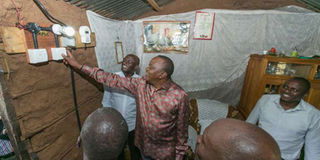Move to connect rural homes with power backfires

President Uhuru Kenyatta switches on the power in a house belonging to a beneficiary of the Last Mile Connectivity project. PHOTO | FILE | NATION MEDIA GROUP
What you need to know:
- Most rural homes have failed to pay for the service, leading to losses.
The Jubilee government’s push to hook up rural households to the national power grid under the Last Mile project continues to meet strong setbacks as homes default on buying electricity.
Kenya Power regional managers who spoke to the Sunday Nation in confidence said they have been forced to seize several meters from rural households who are unwilling to pay for power or could not afford it.
“Some did not need power in the first place, so when they have Sh100 for example, they would rather spend it on food. Others simply thought it was completely free and have never bought tokens after the free units were exhausted. They barely even understand that the meter is supposed to be paid for in instalments yet they signed agreements,” said a manager based in the Eastern region.
Others disclosed that customers resorted to illegal connections that bypass meters after they were disconnected for failing to purchase top-ups.
The theft of power in rural areas has become a lucrative business run by former Kenya Power staff and electricians contracted in the World Bank-funded Last Mile Connectivity Project.
The initiative, which left Kenya Power with Sh2.8 billion in bad debts, according to the 2017/2018 audit, now risks more assets lying idle as the utility service provider is forced to recover unused meters though it invested heavily in distribution infrastructure.
The latest economic survey reveals that revenues from rural electrification continued to decline even as the number of households reportedly connected are on the rise, a sign that all is not well with the plan.
“The number of customers connected under the rural electrification programme expanded by 5.8 per cent to 1.41 million in 2018/19 from 1.33 million in the 2017/18, mainly drawn from domestic and small commercial categories. However, revenue realised declined by 9.1 per cent from Sh11.84 billion in 2017/18 to Sh10.77 billion in 2018/19,” the Kenya National Bureau of Statistics wrote in the report released last week.
It essentially shows that Kenya Power connected 77,047 more customers in rural areas during the year but collected Sh1.07 billion less.
This compounds a problem the firm has been battling since heightened connections before the 2017 General Election, a move that has pushed it deeper into a financial hole, with an estimated one million households supplied with power and prepaid meters fitted but who are neither consuming it nor even bothering to pay for it.
Idle gadgets, however, mean that Kenya Power has increased the cost of maintaining additional lines that do not contribute to growth in revenue despite consuming huge costs in field inspections and even recoveries to enforce payments.
Customers were connected to power free of charge but are expected to pay Sh15,000 through purchase of tokens within two years.
The economic survey also reported reduction in sales in rural areas, with a 5.4 per cent drop recorded to 569GWh in 2019 largely due to the availability of stolen electricity.
Kenya Power has been in a race to increase the number of household connections, in line with the Jubilee administration’s election pledges and ambitious plan to have every household connected to the grid by 2022.
Dwindling revenues from the plan will continue to pile pressure on Kenya Power, which is now asking for an upward adjustment in tariffs to save itself from distress as the government focuses more on network expansion to unconnected rural areas.
The utility firm, which posted a 91.98 per cent decline in net profit to Sh262 million from Sh3.27 billion for the financial year to June 2019, is also said to be pushing for better rates for future power purchase agreements as the cost was one of the reasons its bottom line was depressed despite rising revenues to Sh133.1 billion on more electricity sales.





